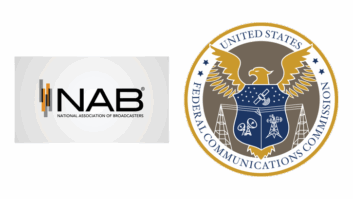Four months into his tenure as FCC chair, Brendan Carr came to Capitol Hill to provide lawmakers with a status report. After his opening remarks, he was confronted by several Democrats regarding efforts to target DEI policies and a perceived push to go after media entities unfavorable to President Trump.
Carr also expressed support toward AM radio and local broadcasters.
He testified before the U.S. House Appropriations Subcommittee on Financial Services and General Government during an oversight hearing of the commission.

In his opening statement, Carr emphasized priorities under his leadership since being named chairman by Trump following his January inauguration. These included ongoing deregulatory efforts, workforce changes and a push to restore congressional spectrum authority.
Carr touted the FCC’s “Delete, Delete, Delete” initiative, aimed at eliminating what he described as unnecessary regulatory burdens. “We received great feedback from a range of stakeholders already,” he said, “and plan on eliminating onerous, antiquated and unlawful regulations across the board.”
He praised the commission staff, noting that the FCC has reduced its full-time employee count from 1,461 to 1,383 since the beginning of the fiscal year. He attributed the reduction to natural turnover, an early retirement program initiated by former Chairwoman Jessica Rosenworcel and a deferred resignation window offered by the Trump administration.
Carr also highlighted the return to in-office work. While 98% of employees had teleworked under pandemic policies, more than 92% are now back in the office full-time. This shift, he said, has led to “more collaboration and teamwork.”
“The agency is well positioned to continue carrying out its statutory mission for the remainder of Fiscal Year 2025 and beyond,” he said, adding that the FCC is currently operating within budget.
Carr urged Congress to restore the FCC’s lapsed auction authority, calling it critical to U.S. leadership in global telecommunications. “When we free up spectrum, the world takes notice,” he said, pointing to approximately $230 billion in revenue generated from the FCC’s 100 previous auctions.
He also connected these revenues to national security, noting that proceeds from the AWS-3 auction have helped fund the agency’s “Rip-and-Replace” program, which facilitates the removal of insecure equipment from Chinese firms Huawei and ZTE.
Later in the one hour and fifty-two minute session, Carr noted that the commission would vote the following day on whether labs that certify imported electronics are themselves trustworthy — a move related to strengthening the supply chain for U.S. electronics.
A full text of Carr’s remarks can be found here.
Prior to his statement, Ranking Member Steny Hoyer (D-Md.) expressed concern regarding the actions of the commission since Trump took office.
“What was once an independent, impartial agency, has become, in my view, to some degree, the speech police — another cudgel in the president’s culture war,” Hoyer said.
Questions related to local media ownership
Following his remarks, Carr received several questions from members of Congress related to local media and the future of media ownership rules. Radio World reviewed the questioning, which is available on YouTube.
“There’s a lot of concern in the country right now about legacy national news media,” Carr said. “But there’s a tremendous amount of trust when it comes to local broadcasters. We need to empower them.”
He cited a visit to a radio station in Powell, Wyo., where he said it was being fed directly from a source in Chicago. Carr said the station didn’t have the scale to provide local news and information.
“We have rules at the FCC that said the operation could not expand and bring localism because of outdated media ownership rules,” he said.
Carr continued: “FCC regulations in the media space are decades old. They may have made sense in a world where people got their news from the morning newspaper and evening television — but that’s no longer today’s reality. Local broadcasters should be allowed to compete on the same scale as Big Tech.”
Rep. Ashley Hinson (R-Iowa) cited the Cedar Falls-based Coloff Media’s challenge in competing with iHeartMedia in her district. She asked Carr if her constituents could send in comments to flag specific rules to make their jobs easier. He encouraged the feedback.
“Maybe there are regulations that are fine for iHeart,” he said, “but that could be the difference between whether a small broadcaster can stay in business.”
Support for AM radio and holding licensed broadcasters “accountable”
Rep. Mark Alford (R-Mo.) asked Carr about the AM Radio for Every Vehicle legislation. “I’m proud to say the F-150, built in Kansas City, still has an AM radio in it,” Alford said.
Carr pledged his support. He called AM “a vital communications technology.” He said electric vehicle makers’ concerns on motor interference are quelled with “relatively inexpensive shielding.” He said it would be important to get the bill “across the finish line and into law.”
Alford also praised Carr for his efforts to hold media companies accountable. He cited CBS’ editing of its interview with former Vice President Kamala Harris to “promote an agenda.” Alford asked Carr about the responsibility of media companies to operate with “truth and balance.”
Carr said that a broadcaster on licensed airwaves is “differently situated” than someone on the internet or a cable channel. He said that Congress has decided that those broadcasters have an obligation to operate in the public interest.
“I think over the years, the FCC has walked away from enforcing the public interest obligation,” Carr said.
Hoyer disagreed, saying that media outlets such as NPR, PBS, NBC, ABC, CBS and other networks are being targeted because they are perceived to be unfavorable to the president and his policies.
“The First Amendment is not intended to protect the president from the press,” he said.
Commission’s public media investigations surround commercials
The chairman was also asked about public media funding from Congress.
Carr’s answer steered toward ongoing investigations into whether NPR and PBS member stations have run commercials that violate the commission’s underwriting rules.
[Related: “FCC Chair Brendan Carr Orders Investigation Into PBS, NPR Sponsorships”]
He cited that their noncom status gives them additional protections. If the commission’s investigations prove that the public stations have violated underwriting rules, “that does raise additional questions about funding from Congress, but right now, we’re focused on that question about whether they’re running prohibited advertisements or not,” he said.
DEI policies and Verizon-Frontier merger
Carr received two rounds of questions on the FCC’s role in investigating diversity, equity and inclusion practices.
Rep. Sanford Bishop (D-Ga.) asked whether attention to DEI issues came at the expense of other initiatives like rural broadband. Carr replied, “There’s been no tradeoff. We’re pursuing all of our priorities.”
Rep. Glenn Ivey (D-Md.) pressed Carr on his accusation of “invidious discrimination” in Verizon’s DEI efforts. Verizon changed its DEI policies on May 15, one day before the FCC approved its merger with Frontier. Ivey asked if the FCC reviewed the facts before Carr’s public letter. Carr responded that all actions were within standard commission process. Ivey’s questioning was cut short when his allotted time expired.







